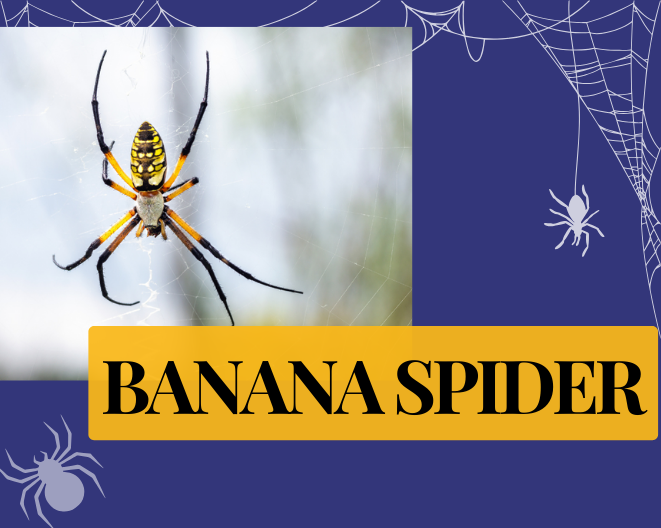People have always been fascinated by and afraid of banana spiders due to their remarkable size and appearance. These arachnids have an unjustifiably bad reputation due to their frequent misinterpretation of their threat. Although the thought of getting bitten by a spider might be horrifying, how harmful can a banana spider bite be? We must investigate the biology and activities of these spiders and distinguish reality from fiction to provide an answer to this topic.
Understanding Banana Spider
The phrase “banana spider” refers to many spider species. It includes multiple species, including the Golden Silk Orb-Weaver and Brazilian Wandering Spider, which are the most renowned. These two spiders have quite distinct behaviors and human threats.
The Golden Silk Orb-Weaver (Nephila) is famous for its golden web in the sunshine. Tropical woods are full of these webs, which can span several feet and stretch between trees, plants, and buildings. Spiders of this size are harmless despite their menacing appearance. They prefer capturing flies and mosquitoes over dealing with humans.
The Brazilian Wandering Spider (Phoneutria) is one of the most poisonous spiders in the world. This Central and South American tropical spider hunts on the forest floor without webs. Its aggressiveness and strong poison make it dangerous.
Banana Spiders and Their Bite
Knowing the different banana spider species is crucial to avoiding bites. People generally assume all “banana spider” species are hazardous, but that’s not true.
The Golden Silk Orb-Weaver bite is poisonous but seldom dangerous. Bite effects generally include moderate discomfort, irritation, or redness. They inject venom to incapacitate tiny insects, not people. A bite may hurt, but unless the person bitten has an allergic reaction, which is unusual, it is not major.
The Brazilian Wandering Spider tells a different tale. These spider bites are far more harmful. Its venom includes a neurotoxic that affects the neurological system, causing breathing problems, muscular weakness, and extreme discomfort. Due to antivenom, this spider seldom kills, although it should be avoided.
How Likely Are You to Get Bitten?
The size and bright colors of banana spiders scare most people. In nature, banana spiders are not aggressive. They avoid people and only bite if threatened, like when handled or when someone accidentally disrupts their web. Golden Silk Orb-Weavers are amiable spiders that prefer to avoid humans.
Though more aggressive, the Brazilian Wandering Spider does not intentionally seek out humans to bite. Spiders bite when confined, such as when they hide in clothes, shoes, or other things where people may accidentally touch them.
Symptoms of a Banana Spider Bite
If you get bitten by a banana spider, the symptoms can vary depending on the species that bit you.
Golden Silk Orb-Weaver
For Golden Silk Orb-Weaver bites, the symptoms are generally minor, including:
- Localized pain
- Redness or swelling at the bite site
- Mild itching or irritation
These symptoms usually subside within a few hours or days without medical intervention. A cold compress and over-the-counter pain relief are typically enough to manage any discomfort.
Brazilian Wandering Spider
However, a bite from a Brazilian Wandering Spider could result in more severe symptoms, such as:
- Intense pain at the bite site
- Swelling that can spread
- Muscle cramps or spasms
- Nausea or vomiting
- Increased heart rate
- Difficulty breathing (in extreme cases)
If you suspect you’ve been bitten by a Brazilian Wandering Spider, it’s important to seek medical attention immediately. While most bites do not lead to severe consequences due to the availability of effective antivenom, prompt treatment is crucial.
First Aid for Banana Spider Bites
If you get stung by a banana spider, here are some things you can do to make the pain less severe and keep things from getting worse:
- Clean the bite: To keep the spot from getting an infection, wash it gently with soap and water.
- Put ice on it. A cold rub can help reduce swelling and ease pain.
- Painkillers should be taken: Ibuprofen and other over-the-counter medicines can help with pain and stiffness.
- Keep an eye out for allergic reactions: Watch out for more dangerous signs, like having trouble breathing, feeling dizzy, or having swelling that goes beyond the bite site. These could be signs of an allergy or a more serious response.
Talk to a doctor if your symptoms don’t get better after a few hours or if they get worse.
Is Banana Spider Beneficial?
Despite the horror they may elicit, banana spiders perform an important role in ecological equilibrium. As adept hunters, they contribute to the management of insect populations like as mosquitoes, flies, and other pests. Without spiders like the Golden Silk Orb-Weaver, insect populations may increase, affecting agriculture, disease transmission, and overall comfort in outdoor habitats.
Even the Brazilian Wandering Spider, while venomous, provides an important ecological purpose by feeding on a variety of insects and small animals, keeping populations in check.
Myths and Facts About Banana Spider
Myth 1: All banana spiders are deadly.
Fact: Only a few species, such as the Brazilian Wandering Spider, pose significant risks to humans. Most banana spider bites are harmless.
Myth 2: Banana spiders actively hunt humans.
Fact: Banana spiders are not aggressive toward humans. They bite only in self-defense.
Myth 3: A banana spider bite will always make you sick.
Fact: In most cases, banana spider bites lead to minor symptoms like itching or redness.
Should You Be Worried?
Most banana spider species are harmless, despite the disturbing thought of a spider bite. The Golden Silk Orb-Weaver is a garden friend that deters pests. Although the Brazilian Wandering Spider is a serious threat, bites are infrequent and curable with timely medical attention.
Banana spider bites are usually short and unpleasant. You may prevent concern and danger from these misunderstood critters with the correct information and measures.
How to Avoid Banana Spider Bites
Although banana spiders are usually harmless, it’s best to take steps to prevent getting bitten. Here are some precautions to take, especially if you live where these spiders are common:
- Watch for webs: The Golden Silk Orb-Weaver constructs large, complicated webs between trees and plants. Watch for these webs in the woods to avoid stepping across them.
- Dress protectively: Long sleeves, gloves, and pants help prevent banana spider bites when gardening or working in banana spider-prone locations.
- Shake clothes and shoes: In tropical areas with Brazilian Wandering Spiders, shake off shoes, clothes, and towels before usage since they hide in dark, enclosed locations.
- Do not damage their habitats: Banana spiders attack only when threatened, like other animals. Leave one alone in your yard or natural area to do its thing.
When to Seek Medical Attention
If you’re bitten by a banana spider, especially a Brazilian Wandering Spider, watch your symptoms. Most bites are safe and produce only slight pain, but spider venom allergies can cause serious responses.
If you suffer any of these, visit a doctor:
- Trouble breathing or swallowing
- Bite site discomfort that persists
- Extended bite-related swelling
- Throwing up, dizziness, or nausea
- Muscle spasms
These symptoms may suggest a serious venom response and require medical treatment like antivenom.
Conclusion
The size and look of banana spiders may scare you, yet most are harmless. Banana spiders, or Golden Silk Orb-Weavers, decrease pest populations and are beneficial to gardeners. The bite is harmless unless an allergic reaction occurs, which is unusual.
Due to its strong venom, the Brazilian Wandering Spider is extremely dangerous. Though rare, bites may be treated adequately with modern medicine. Understanding these spiders’ behavior and biology can alleviate fear and help us appreciate their place in nature.
In conclusion, banana spider bites are infrequent and preventable with proper safeguards. These spiders, especially the Golden Silk Orb-Weaver, usually avoid you and provide more help than damage.
FAQs
Banana spiders are venomous but not typically harmful to humans. The term “poisonous” refers to something harmful if ingested or touched, while “venomous” refers to animals that inject venom through bites or stings. Most banana spiders, including the Golden Silk Orb-Weaver, have venom that is only dangerous to their prey, like insects, but is generally not harmful to humans beyond mild irritation.
The name “banana spider” comes from their occasional appearance in banana shipments. Like the Brazilian Wandering Spider, certain species have been found hiding in bananas. Additionally, some spiders in the group are yellowish in color, which could also contribute to the name.
In Florida, Golden Silk Orb-Weavers (commonly referred to as banana spiders) are venomous but not poisonous or dangerous to humans. Their venom is used to subdue prey like insects, and while a bite may cause mild pain or swelling, it’s not life-threatening to humans.
The Golden Silk Orb-Weaver is one of the largest species of banana spiders. Female spiders can grow up to 2 inches (5 cm) in body length, with leg spans that reach up to 5 inches (12.7 cm) or more. Including their legs, they can appear quite large, especially in comparison to other spiders.





